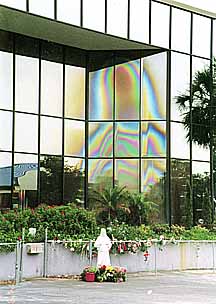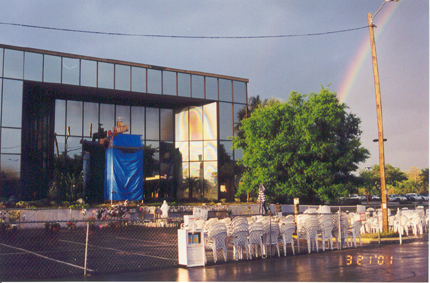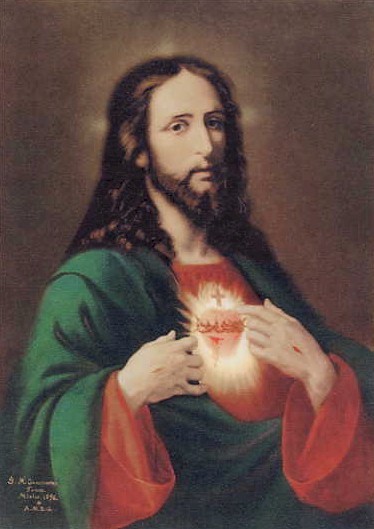I am the good shepherd: the good shepherd is one
who lays down his life for his sheep. The hired man, since he is not the
shepherd and the sheep do not belong to him, abandons the sheep and runs away
as soon as he sees a wolf coming, and then the wolf attacks and scatters the
sheep; this is because he is only a hired man and has no concern for the
sheep. I am the good shepherd; I know my own and my own know me, just as the
Father knows me and I know the Father; and I lay down my life for my sheep.
(Jn 10:11-151)
Yes, the Good Shepherd has laid down His life for us.
Through His brutal death on the cross and His glorious resurrection, Jesus has
given us a new life. Indeed, He has established a new world order. He has
drawn all things to Himself. St. Paul speaks eloquently concerning this in his
Letter to the Colossians:
He is the image of the unseen
God
and the first-born of all creation,
for in him were created
all things in heaven and on earth:
everything visible and everything invisible,
Thrones, Dominations, Sovereignties, Powers—
all things were created through him and for him.
Before anything was created, he existed,
and he holds all things in unity.
Now the Church is his body,
he is its head.
As he is the Beginning,
he was first to be born from the dead,
so that he should be first in every way;
because God wanted all perfection
to be found in him,
and all things to be reconciled through him and for him,
everything in heaven and everything on earth,
when he made peace
by his death on the cross. (Col. 1:15-20).
Pope John Paul II also reminds us of the
cosmic dimension of Christ’s redemptive Incarnation: "The Incarnation
of God the Son signifies the taking up into unity with God not only of human
nature, but in this human nature, in a sense, of everything that is
‘flesh’: the whole of humanity, the entire visible and material
world. The Incarnation, then, also has a cosmic significance, a cosmic
dimension. The 'first born of all creation’ becoming incarnate in the
individual humanity of Christ, unites himself in some way with the entire
reality of man, which is also ‘flesh’—and in this reality with all
‘flesh’, with the whole of creation."2
Yes, through His enfleshment Christ has
assumed, or united to Himself, not only the human family, but the entire world
order. The Christian’s attitude toward authentic human values should
therefore be obvious. He or she should love the world as redeemed by Jesus
more than does the non-believer. The Christian should be the first to love all
authentic human values. The Christian should be the first to promote these
values. Obviously, the real progress of these values can only be according to
their Christic design, however hidden this design may be at times.
Yes, the Christian should be the first to
be willing to suffer for the authentic progress of the human race and the
entire world order. And why? We reiterate—because it all belongs to Christ.
The Christian should grieve because all
is not well with the temporal order. He or she should be duly disturbed that
there is so much violence, murder, social injustice, lust for power, drug
peddling, pursuit of hedonism, increased alienation from God. These and other
evils sadly mar the name and image of Jesus which He imprinted upon the world
through His life, death, and resurrection. The Christian should grieve because
the cosmic face of Christ is thus so often covered by the sinful dust of the
market place.
However, the market place, the temporal
order, is not all evil. Far from it, it is basically good with the creative
goodness of God. It’s basic goodness and beauty have been deepened by the
grandeur of Jesus’ redemptive effort. There is so much good in so many human
hearts, and this goodness manifests itself in so many ways.
Each Christian, grieving at the world’s
evil, but rejoicing in its goodness and potential for greater good, must be
inspired to action. He or she should deeply love the world because it belongs
to Christ. He or she should deeply love the people who cover the face of this
world, because they have been redeemed by the sacred Blood of Jesus, and are
precious to our Savior to a degree we can never fully comprehend.
The love of the Christian for the human
family and the world which encompasses this family must be an operative, an
efficacious love. Permeated with this love, a person must be willing to do, to
accomplish, and, in rare cases, to die for the cause of Christ. Whatever
one’s state of life—whether one is a social activist or a cloistered
contemplative—this is the privilege and the responsibility of the Christian.
The Christian cannot be committed to Jesus in love without concomitantly being
dedicated in love to one’s neighbors and the entire God-given world order.
If the Christian is to promote the good
of the world order, one must be free regarding it. The more one possesses this
freedom, the more one helps promote the Christic progress of the world. We
must be free so that we use the things of this world, or not use them,
depending upon what God’s will directs us to. Indeed, the one involved in
the affairs of the world according to God’s will is the one who helps
promote the world’s true progress.
There follow various thoughts concerning
Christ, the Christian, and the world.
The face stares out at us from the
magazine page. It is the face of a little child, a war orphan. Hunger,
loneliness, fear, physical pain—all this is revealed in the tiny features.
The child has not placed these
afflictions upon herself. No, forces over which she has no control have put
these severe sufferings upon such little shoulders.
As we look at the picture, what is our
reaction? Do we quickly turn to another page to find more pleasant material?
Do we remain basically unmoved by what we see? Do we say others are to blame,
and therefore, we have no responsibility toward such children? Or are we
seriously moved? Do we tell ourselves we all have a responsibility to do
something so that the number of these ravaged children will decrease rather
than increase?
The picture of the child is there for all
of us to see. What picture of ourselves emerges from our particular kind of
reaction?
Pope John Paul II makes this observation
concerning today’s world: "The development of technology and the
development of contemporary civilization, which is marked by the ascendency of
technology, demand a proportionate development of morals and ethics. For the
present, this last development seems unfortunately to be always left behind.
Accordingly, in spite of the marvel of this progress, in which it is difficult
not to see also authentic signs of man’s greatness, signs that in their
creative seeds are revealed to us in the pages of the book of Genesis, as
early as where it describes man’s creation, this progress cannot fail to
give rise to disquiet on many counts. The first reason for disquiet concerns
the essential and fundamental question: Does this progress, which has man for
its author and promoter, make human life on earth ‘more human’ in every
aspect of that life? Does it make it more ‘worthy of man’? There can be no
doubt that in various aspects it does. But the question keeps coming back with
regard to what is more essential: whether in the context of this progress man,
as man, is becoming truly better, that is to say more mature spiritually, more
aware of the dignity of his humanity, more responsible, more open to others,
especially the neediest and the weakest, and readier to give and to aid
all."3
Here is another observation of Pope John
Paul II concerning our present-day world: "A disconcerting conclusion
about the most recent period should serve to enlighten us: side by side with
the miseries of under development, themselves unacceptable, we find ourselves
up against a form of superdevelopment, equally inadmissible, because
like the former it is contrary to what is good and to true happiness. This
superdevelopment, which consists in an excessive availability of every kind of
material goods for the benefit of certain social groups, easily makes people
slaves of ‘possession’ and of immediate gratification, with no other
horizon than the multiplication or continual replacement of the things already
owned with others still better. This is the so-called civilization of
‘consumption’ or ‘consumerism’, which involves so much
‘throwing-away’ and ‘waste’. An object already owned but now
superseded by something better is discarded, with no thought of its possible
lasting value in itself, nor of some other human being who is poorer.
"All of us experience firsthand the
sad effects of this blind submission to pure consumerism: in the first place a
crass materialism, and at the same time a radical dissatisfaction,
because one quickly learns—unless one is shielded from the flood of
publicity and the ceaseless and tempting offers of products—that the more
one possesses the more one wants, while deeper aspirations remain unsatisfied
and perhaps even stifled."4
Vatican II reminds us that Christ in His
paschal mystery has entered into the world’s history, has taken this history
to Himself, and has summarized it:
"For God’s Word, through whom
all things were made, was Himself made flesh and dwelt on the earth of men.
Thus He entered the world’s history as a perfect man, taking that history up
into Himself and summarizing it. He Himself revealed to us that ‘God is
love’ (l Jn 4:8). At the same time He taught us that the new command of
love was the basic law of human perfection and hence of the world’s
transformation.
"To those, therefore, who believe in
divine love, He gives assurance that the way of divine love lies open to all
men and that the effort to establish a universal brotherhood is not a hopeless
one. He cautions them at the same time that this love is not something to be
reserved for important matters, but must be pursued chiefly in the ordinary
circumstances of life.
"Undergoing death itself for all of
us sinners, He taught us by example that we too must shoulder that cross which
the world and the flesh inflict upon those who search after peace and justice.
Appointed Lord by His resurrection and given plenary power in heaven and on
earth, Christ is now at work in the hearts of men through the energy of His
Spirit. He arouses not only a desire for the age to come, but, by that very
fact, He animates, purifies, and strengthens those noble longings too by which
the human family strives to make its life more human and to render the whole
earth submissive to this goal.
"Now, the gifts of the Spirit are
diverse. He calls some to give clear witness to the desire for a heavenly home
and to keep that desire green among the human family. He summons others to
dedicate themselves to the earthly service of men and to make ready the
material of the celestial realm by this ministry of theirs. Yet He frees all
of them so that by putting aside love of self and bringing all earthly
resources into the service of human life they can devote themselves to that
future when humanity itself will become an offering accepted by God.
"The Lord left behind a pledge of
this hope and strength for life’s journey in that sacrament of faith where
natural elements refined by man are changed into His glorified Body and Blood,
providing a meal of brotherly solidarity and a foretaste of the heavenly
banquet."5
Pope Paul VI speaks to us about our life
in Christ: "One could well meditate the ‘distinctive mark’ imprinted
on the Christian; it is a seal superimposed on the divine image already
naturally outlined in the soul of rational man, giving him with
ever-increasing clearness the face of Christ, which the face of the Christian
becomes when stamped with this mystic impression.
"This is a stupendous anthropology,
often too little realized in the conception of man become Christian. Indeed,
today the tendency to secularization, or to neglect of religious values and
duties, leads to disregard of the Christian physiognomy molded by the
sacramental character, so that it often becomes masked (for it cannot be
erased) by a profane appearance.
This very nearly results in a return to a
purely natural or even pagan aspect, the fact being forgotten that the term
‘Christian’ is not simply nominal, but real, involving entrance into the
life of Christ, a decisive act for whoever follows Him, committing him
utterly—if he does not want to betray the honour of his title—to fidelity,
danger, and testimony (Acts 11,26; l Pet 4, 16).6
Here are certain stanzas from one of the
poems of St. Therese of Lisieux, who has recently been declared to be a doctor
of the Church by Pope John Paul II:
It’s to you alone Jesus, that
I’m attached.
It’s into your arms that I run and hide.
I want to love you like a little child.
I want to fight like a brave warrior.
Like a child full of little attentions,
Lord, I want to overwhelm you with caresses,
And in the field of my apostolate,
Like a warrior I throw myself into the fight!…
Your heart that preserves and
restores innocence
Won’t betray my trust!
In you, Lord, rests my hope.
After this exile, I’ll go to see you in Heaven…
When in my heart the storm arises,
To you, Jesus, I lift up my head.
In your merciful look,
I read: "Child, for you I made the Heavens".
I know well, my sighs and tears
are before you, all radiant with charms,
The seraphim in Heaven form your court,
And yet you beg for my love!…
You want my heart, Jesus, I give it
to you.
I surrender all my desires to you,
And those whom I love, O my Spouse, my King,
From now on I only want to love them for you.7
Here is an excerpt from a spiritual
journal: "And I opened my heart, but I waited and felt suspended in
mid-air for my whole desire was to embrace Him and it felt as if He did not
come. I suffered and suffered and wanted only to experience Him with this
outpouring of His grace. Then His grace overtook my weary soul and He dwelt in
me in this heightened form. The Bridegroom made Himself known to me and then
it felt as if this intensity had left, but the lingering memory of this moment
when He intimately united Himself to me was implanted forever on my weary
soul, as I sit and wait for that day when I will experience the fulfillment of
myself existing only in Him. I long to have oneness in the Divine Master, the
Bridegroom of my soul. I love you Jesus, come to me, that I may know you most
intimately. Embrace my soul and fill me with your gifts. I desire to
experience the deepest union with you, my Bridegroom, Jesus Christ, Savior of
the world, Lamb of God. Through my union with you, My Jesus, I desire to
experience the deepest union with the Father in the Holy Spirit."
And, "I rested my head on the
pierced chest of my Savior. I felt His presence and put my head on His pierced
wound. I see His side and I experience the wound within my own heart. His
Heart was wounded by our sins, and I rest upon this wound.
"Open up the wound and go into His
burning Heart. See the wound opening and enter into the great, red abyss of
His fiery love. It is in the wound that I enter.
"His glorified body has this wound.
It is from His pierced Heart that our life flows.
"The glorified wounds of Christ are
my delight. He carried the cross. He bore the pain. He was pierced that we
could live in Him!"
NOTES:
- Scriptural quotations are taken from The Jerusalem
Bible, Doubleday & Co.
- Pope John Paul II, Encyclical Dominum et Vivificantem,
as in The Encyclicals of John Paul II, edited with introductions
by J. Michael Miller, C.S.B., Our Sunday Visitor Publishing Division, No.
50. 3.
- Pope John Paul II, (Encyclical) Redemptor Hominis,
as in The Encyclicals of John Paul II, (see above note), No. 15.
4.
- Pope John Paul II, Encyclical Sollicitudo Rei
Socialis, as in The Encyclicals of John Paul II, (see note 2
above), No. 28. 2&3.
- The Documents of Vatican II, "Pastoral
Constitution on the Church in the Modern World", America Press
Edition, No. 38.
- The Teachings of Pope Paul VI, Libreria Editrice
Vaticana, p. 125.
end of excerpt from Newsletter 1998 - Issue 3
August 11, 1994
Excerpt from the Red Rosary Book
Jesus speaks: Oh, how I watched you, child. I
watched you as I gave you each little sign of My love. I watched you grow in
your faith and trust in Me. I watched you suffer and stood so close you could
have touched Me, but you didn't know that this suffering would be that which
led you to My tender love for you.
I watched you when you surrendered and turned your will over
to Me and I watched you cry, knowing this was the most joyous day of your
life. I watched you see visions of doors and knew you would want to go through
those doors, but they were not the doors you thought, they were the doors I
gave you for greater union with Me. I watched you, child, when you wrote down
My first letter to you and I saw your confusion and joy, knowing what these
letters would do to touch so many hearts.
I watched you, child. I watched you when I showed you My
Heart and you were so warmed by this Heart and so awed by its vision, but you
didn't know what this vision would mean for many to draw their hearts to My
burning love.
I watched you surrender each time as you let go of each
little thing, as you were dying to self. I watched you through this surrender
grow closer to Me. I watched you grow in this deep love for Me, step by step.
I watched our love grow as you gave more of yourself in prayer. I watched you,
child, and I loved being ever closer to you.
I watched you struggle in such trials that you thought
tomorrow would never come, knowing that this trial was what would give you
more freedom and love for Me. I watched you learn each lesson through hard
tests and I was so close while you struggled, but did not remove the struggle,
knowing you would not learn your lesson if I had.
I watched you, child, through each joy and pain and I loved
you silently, always with you, and you never knew how close I truly was to
you.
Song: From the day you were born…
From the day you were born, I watched you. Forever by your
side, I guarded you, I loved you. I know the most secret desire of your heart
far better than you yourself know. I know the Father's plan for you. I know
the Father's love for you. I know the love poured on you from the Holy Spirit
and how Mary is forever by your side.
I watch you, child, constantly guarding you and your ways
and you do not know the love I have for you. You do not know how My Heart
burns for love of you. And, someday, My beautiful child, you will know what I
have in store for you, My beloved.
Come and be with Me. Grow in your love with Me. I never
leave you, My beloved. Remember, I am forever watching you.
end of August 11, 1995 message




